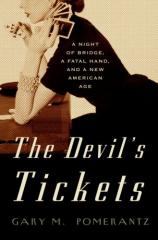The Devil’s Tickets: A Night of Bridge, A Fatal Hand, and a New American Age
Review
The Devil’s Tickets: A Night of Bridge, A Fatal Hand, and a New American Age
This is (among other things) the age of Sudoku. Well, maybe that’s a little extravagant, but to the extent that we have widespread crazes in the 21st century, Sudoku is (or was) one of them. Sudoku is solitary, intellectual, logical, online and disposable. Nobody ever spent two seconds with a Sudoku puzzle after it was finished, or spent any length of time discussing their favorite puzzles with friends. And nobody ever killed anybody over Sudoku, or so I hope not.
But in the 20th century, you remember, entertainment options were a bit more limited. People didn’t have Blu-ray discs or online poker or Twitter or any of a number of other things that we have to amuse ourselves. In the 1920s, they didn’t even have television. What they had (among other things) was contract bridge.
This is not to say that we don’t have contract bridge in this century. Because we do. I’m almost sure of it. But what we have now is largely one of two things: tournaments where enthusiasts play over a weekend, like a hobby, or online gaming forums where nobody ever knows anybody else and all the cards are virtual. The contract bridge they had in the 1920s and 1930s --- bridge teas where otherwise unoccupied wives gossiped over cucumber sandwiches and small slams --- is deader than Walter Winchell.
The Twenties were a good time for contract bridge. Were they a better time than now? You might ask Jack Bennett, traveling salesman, bad golfer and pillar of the Kansas City middle class. He drives around the Midwest in a Hupmobile, sells perfume to general stores, eats thick steaks without even knowing that the word “cholesterol” existed, and occasionally enjoys the favors of women who are not his wife. It was a man’s world, and Jack could tell you all about it, if it wasn’t for the fact that his wife shot him dead in 1929 over a badly-played hand of bridge.
You wouldn’t want to ask Myrtle Bennett the same question, although it would have been easier to do so. After shooting her husband, she survived into the 1990s. She was left alone for much of her marriage, always wondering where Jack was and what he was doing, and with whom he was doing it. Add to that the pain of several miscarriages and a society that expected her (among other things) to interrupt an otherwise-cordial game of bridge to get her husband’s breakfast ready for the next morning, and well, you don’t have a recipe for domestic felicity there.
Husbands and wives shoot each other with at least some regularity, and the Bennett case was --- under normal conditions --- nowhere near exceptional enough to merit a great deal of public notice, still less a book written about it 80 years after the fact. What made the Bennett case a sensation in its time was the role of contract bridge in the murder. While Jack’s poor bridge play (Myrtle had bid four spades, sat out the hand as dummy, only to find that Jack had lost a makeable contract) was certainly a factor, it was far from the only one. But with contract bridge on the upswing in 1929, the Bennett case became a media sensation.
THE DEVIL’S TICKETS combines the story of the ill-fated Bennett marriage with another union, between bridge players Ely and Jo Culbertson. The Culbertsons were, at the time, engaged on a huge, improbable project to make themselves into the first couple of bridge --- and to make millions in the process. The idea was to make bridge edgier and sexier, and the Bennett case was tailor-made for their sizable ambitions.
Unfortunately, the stories of the Bennetts and the Culbertsons don’t dovetail all that well, and THE DEVIL’S TICKETS wanders more often than it should. But anyone with a serious interest in the era, or bridge, will find the book to be a welcome treat.
Reviewed by Curtis Edmonds on December 29, 2010
The Devil’s Tickets: A Night of Bridge, A Fatal Hand, and a New American Age
- Publication Date: June 9, 2009
- Genres: History, Nonfiction
- Hardcover: 320 pages
- Publisher: Crown
- ISBN-10: 1400051622
- ISBN-13: 9781400051625




